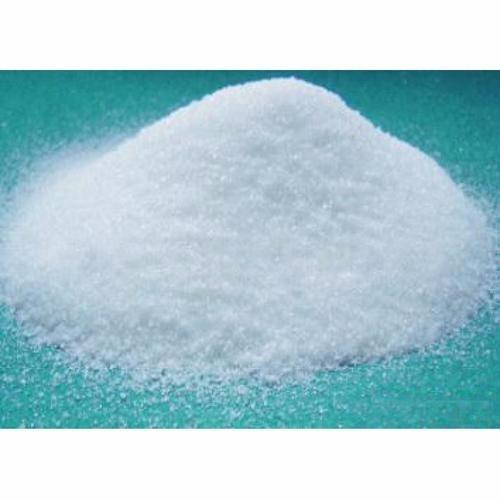
Properties Malic acid has three isomers: L-malic acid, D-malic acid, and DL-malic acid. Naturally occurring malic acid is all in the L-form and is present in almost all fruits, with the highest content in pomaceous fruits. Malic acid is colorless acicular crystals or white crystalline powder, odorless, and has a pungent and refreshing sour taste. The most common one is the levorotatory form, L-malic acid, which is found in the juice of unripe hawthorns, apples, and grapes. It can also be produced by the biological fermentation of fumaric acid. It is an important intermediate in the human internal circulation and is easily absorbed by the human body. Therefore, as an excellent food additive and functional food, it is widely used in the fields of food, cosmetics, medicine, and health products. The racemic form (DL-malic acid) can be prepared from fumaric acid or maleic acid under high temperature and high pressure conditions with the action of water vapor and in the presence of a catalyst. Applications and Functions Food Industry Applications L-malic acid is an important component of natural fruit juices. Compared with citric acid, it has a stronger acidity (20% stronger than citric acid), but a milder taste (with a higher buffering index), and a special fragrance. It does not damage the mouth and teeth, is beneficial to the absorption of amino acids in metabolism, and does not accumulate fat. It is a new generation of food acidulants and is praised by the biological and nutritional circles as the "most ideal food acidulant". Since 2013, it has been replacing citric acid in foods for the elderly and children. L-malic acid is an essential organic acid for the human body and an ideal low-calorie food additive. When 50% L-malic acid is used together with 20% citric acid, it can present a strong natural fruit flavor. Beverages (all kinds of refreshing beverages): Soft drinks formulated with L-malic acid are thirst-quenching and refreshing, with an apple sour taste, close to natural fruit juice. Some large domestic food companies, such as the Wahaha Group and the Jianlibao Group, have begun to use L-malic acid in their beverages. L-malic acid is an intermediate in the tricarboxylic acid cycle of organisms. Its taste is close to that of natural fruit juice and it has a natural fragrance. Compared with citric acid, it generates less heat and has a better taste. Therefore, it is widely used in various foods such as wines, beverages, jams, and chewing gums, and there is a trend of gradually replacing citric acid. It is one of the organic acids with the largest usage in the world's food industry and has good development prospects. L-malic acid contains natural skin-moisturizing ingredients, which can easily dissolve the "adhesive substances" between dry, scaly dead cells, thus removing wrinkles on the skin surface and making the skin tender, white, smooth, and elastic. Therefore, it is highly favored in cosmetic formulations. L-malic acid can be used to formulate various flavors and fragrances and is used in a variety of daily chemical products, such as toothpaste and shampoo. Compared with citric acid, the sour taste of L-malic acid is milder and more unique. Therefore, abroad, it is used to replace citric acid as a new type of washing aid for the synthesis of high-grade special detergents. L-malic acid can be used to treat a variety of diseases such as liver diseases, anemia, low immunity, uremia, hypertension, and liver failure, and can reduce the toxic effects of anti-cancer drugs on normal cells. It can also be used for the preparation and synthesis of anthelmintics and anti-tartar agents. Pharmaceutical Industry Applications Adding malic acid to various tablets and syrups can give a fruit flavor and is beneficial for absorption and diffusion in the body. It is often added to compound amino acid injection solutions to improve the utilization rate of amino acids. Its sodium salt is an effective drug for treating liver dysfunction, especially hypertension. Potassium L-malic acid is a good potassium supplement drug, which can maintain the water balance of the human body and treat diseases such as edema, hypertension, and fat accumulation. L-malic acid can be used in pharmaceutical preparations, tablets, and syrups, and can also be added to amino acid solutions, which can significantly improve the absorption rate of amino acids. L-malic acid can be used to treat a variety of diseases such as liver diseases, anemia, low immunity, uremia, hypertension, and liver failure, and can reduce the toxic effects of anti-cancer drugs on normal cells. It is also used for the preparation and synthesis of anthelmintics and anti-tartar agents. In addition, L-malic acid can also be used as an industrial cleaning agent, resin curing agent, synthetic material plasticizer, feed additive, etc. Daily Chemical Industry Applications Zinc L-malic acid is used in toothpaste as an anti-plaque agent and anti-tartar agent, and in the formulation of synthetic fragrances. Chemical Industry Applications It can be used as one of the raw materials for the synthesis of scale removers and fluorescent whitening agents. When added to shellac varnish or other varnishes, it can prevent the paint surface from crusting. The polyester resins and alkyd resins produced with this acid are plastics with special uses. Agricultural Applications In November 2022, Chinese scientists found through research that the selection of organic acids such as malic acid (for flavor) was completed during the improvement process of watermelons.